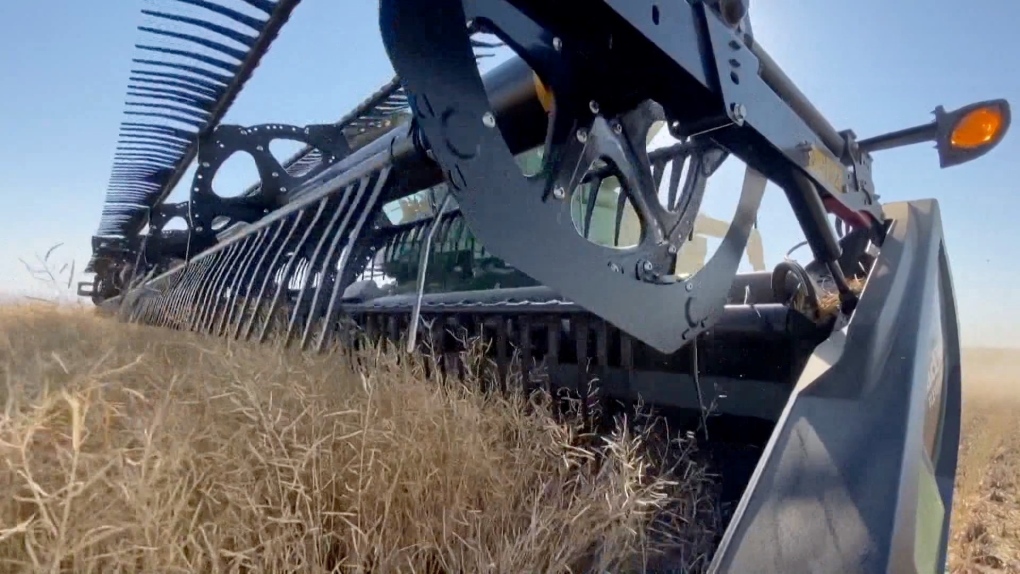Canada set to experience shortage of farmers, RBC report says
 Over the next 10 years, 40 per cent of Canada's farm operators are set to retire, leading to one of the biggest labour and leadership transitions in Canadian history, according to an RBC report.
Over the next 10 years, 40 per cent of Canada's farm operators are set to retire, leading to one of the biggest labour and leadership transitions in Canadian history, according to an RBC report.
The Canadian agriculture industry is headed for a shortfall of operators and labourers, and those left are getting older, according to a report published by RBC.
In 2001, Canada had 346,000 farmers with an average age of 50.
In 2021, the number of farmers dropped to 262,000 while their average age rose to 56.
"A rapidly approaching demographic crisis is going to make the problem even worse. In 10 years alone, 60 per cent of today's farm operators are going to be over the age of 65," said Mohamed Yaghi, author of the report and RBC lead for agriculture and climate policy.
Over the next 10 years, 40 per cent of Canada's farm operators are set to retire, leading to one of the biggest labour and leadership transitions in Canadian history, according to the report.
The numbers are worrying, but not that shocking for experts.
"We aren't surprised by the results of the report, and it is somewhat concerning from the aspect that we know, much like the rest of society, we have an aging population in the farming industry and we're going to be losing maybe up to 40 per cent of that work force in the next number of years," said Keith Currie, president of the Canadian Federation of Agriculture.
Some in the agriculture industry aren't too concerned about the projected operator shortfall.
Stephen Vandervalk, who grows malt barley among other crops near Fort Macleod, says the high demand for land will ensure all of Canada's farmlands will always be farmed.
But he recognizes there is a skilled labourer shortage and that may have an impact.
"There is definitely a shortage of skilled farm labour, there's no doubt about that. But as far as operating farms and farmers being there to manage the land, that's never going to be an issue," Vandervalk said.
Currie believes the operators and skilled labourer shortage could lead to a decline in farm production.
This could lead to Canada needing to increase food imports.
"We have concerns potentially around some of our high value fresh products in particular, fruits and vegetables, may see a decline in production," Currie said.
The RBC report makes a number of recommendations to increase the farming workforce.
Suggested steps include increasing immigration of farm operators to Canada, promoting agriculture at colleges and universities as well as increasing automation could offset the forecasted operator shortage.
CTVNews.ca Top Stories

After warmest on record, winter looks to 'salvage its reputation': Weather Network
Canada's warmest winter on record is unlikely to make a repeat performance this year, The Weather Network's chief meteorologist says, as a new seasonal forecast suggests the season will try to 'salvage its reputation.'
W5 Investigates Canada's least wanted man: A family's long and lonely fight to bring their son home from Syria
Counterterrorism experts and humanitarian groups are urging countries to repatriate suspected ISIS members, as one family tells CTV W5 about their long and lonely fight to bring their son home from Syria.
Israel-Hezbollah ceasefire appears to hold as Lebanese begin streaming south to their homes
A ceasefire between Israel and the Lebanese militant group Hezbollah that began Wednesday appeared to be holding, as residents in cars heaped with belongings streamed back toward southern Lebanon despite warnings from the Israeli and Lebanese militaries that they stay away from certain areas.
Canada approves Novo Nordisk's obesity drug to reduce risk of non-fatal heart attack
Canada's health regulator has approved Novo Nordisk's weight loss drug Wegovy to reduce the risk of nonfatal heart attack or myocardial infarction in some adults, the Danish drugmaker said on Wednesday.
$30K used as payment in 1990s murder-for-hire plot must be forfeited: B.C. court
A B.C. court has ordered the forfeiture of $30,000 in cash that was seized during a murder-for-hire investigation more than 30 years ago.
N.S. Progressive Conservatives win second majority government; NDP to form opposition
For the second time in a row, Tim Houston's Progressive Conservatives have won a majority government in Nova Scotia. But this time, the NDP will form the official opposition.
A fugitive wanted in the U.S. for a pair of bombings is arrested in the U.K. after 20 years on the run
A suspected animal rights extremist wanted in the U.S. for bombings in the San Francisco area was arrested in Britain after more than 20 years on the run from the law, officials said Tuesday.
Should Canada retaliate if Trump makes good on 25 per cent tariff threat?
After U.S. president-elect Donald Trump threatened to impose a 25 per cent tariff on all Canadian imports on his first day back in the White House unless his border concerns are addressed, there is mixed reaction on whether Canada should retaliate.
International Criminal Court prosecutor requests arrest warrants for the head of Myanmar's military regime
The International Criminal Court's chief prosecutor asked judges on Wednesday to issue an arrest warrant for the head of Myanmar's military regime for crimes committed against the country's Rohingya Muslim minority.

































